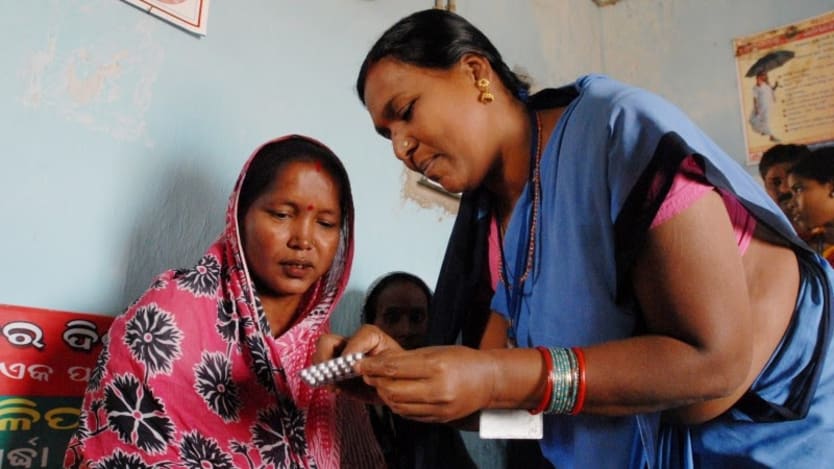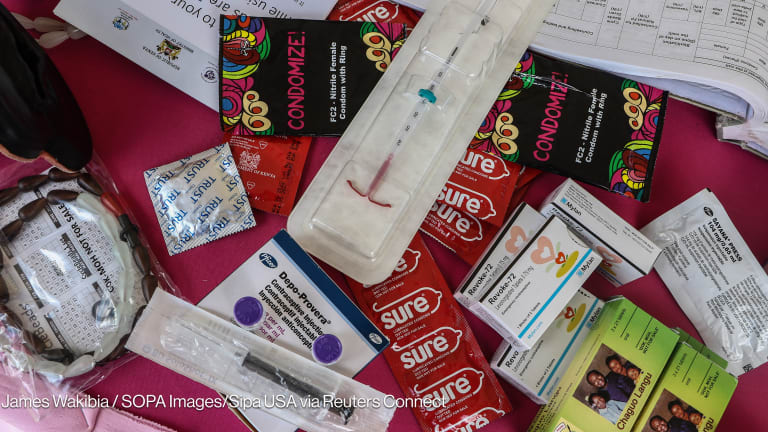
Health experts do not know how COVID-19 affects pregnant women and their babies. Not enough information is available. Initial claims that the coronavirus does not pose any ill effects in pregnancy may turn out not to be true, according to a Northwestern Medicine study that found abnormal blood flow between mothers with COVID-19 and their babies in utero.
Can women's health clinics regain ground after 'the most disruptive interruption'?
Logistical challenges and supply chain bottlenecks have challenged women's access to sexual and reproductive health care during COVID-19. Telemedicine and other new strategies may find a permanent place in this work moving forward.
With overwhelmed health facilities and health care workers, women are anxious about accessing medical services, especially reproductive health services — including for prenatal care, labor, and delivery.
It may not at first seem obvious why reproductive health is vital at a time like this. But the COVID-19 crisis makes an unintended pregnancy even more dangerous for a woman and her child, showing that reproductive health and family planning must be considered essential health needs — especially during a pandemic.
Women may wisely want to delay pregnancy until health systems are less overwhelmed with patients with critical needs, but many in low- and middle-income countries will find it difficult to do so due to limited services, providers, and supplies, as well as restricted mobility during lockdowns.
I am part of World Vision, a Christian humanitarian aid organization that believes the physical and spiritual well-being of individuals is God’s intention for all. We define reproductive health as a state of physical, mental, social, and spiritual well-being in all matters relating to the reproductive system at all stages of life, including prenatal and newborn care, labor and delivery services, family planning services, prevention of HIV, discouragement of harmful traditional practices like female genital mutilation, and more.
Reproductive health services are a part of our holistic approach to empowering the most vulnerable communities to address the root causes of poverty and injustice. World Vision does not provide, recommend, or support abortion.
I believe that maintaining the availability of reproductive health services is especially essential during this unprecedented time. At the time of publication, over 19 million people around the world have been diagnosed with COVID-19, with over 715,000 deaths.
Everyone — from governments and ministries of health to local clinics and community health workers — is scrambling to adjust and support health systems to respond to the needs of sick and healthy people and to prevent further spread. Reproductive health must remain a core part of health care as it struggles to adapt.
Opinion: How will COVID-19 affect global access to contraceptives — and what can we do about it?
Delays in production, regulatory approvals, and shipping schedules could affect access to contraceptives worldwide. In the face of global uncertainty, this op-ed puts forward some key recommendations to help health care workers prepare as best as they can.
Not only might the need for family planning services be heightened, but the usual way of accessing services, including those for contraception, will also have to adapt. Some countries and communities are seeing a gradual shortage in contraceptive commodities like condoms or oral contraceptive pills, as many companies that manufacture them are in Asia, where the impact of COVID-19 was first experienced.
Additionally, some health workers are being pulled from antenatal care and family planning services to focus on the COVID-19 emergency response, leading to shortages of reproductive health workers, and some health facilities are closed to reduce crowds and close gatherings. Meanwhile the potential for pregnancy is higher now more than ever with couples in constant close proximity.
With the current challenges and restrictions, what can be done to meet the reproductive health needs of women? Innovation and creativity in approach are necessary, and we are seeing communities adapt to challenges in these ways:
Provision of virtual care — especially to the younger generations — via telephone, video chats, and apps enables health workers to provide contraception information and counseling. Referrals to health facilities and services, where available, can also be made virtually.
Household visits by community health workers and volunteers are being done instead of group and community forums to provide family planning and other reproductive health information and services — with the strict use of personal protective equipment being adhered to.
Information on long-acting, reversible contraceptive methods, such as IUDs or implants, is being provided as a voluntary option, where services are available, to minimize the number of visits to health care facilities. However, the disadvantage of IUDs and implants is that a trained provider and facility are needed to administer these methods.
Community health volunteers provide options and information about family planning methods that don’t require a medical professional or clinical visit, such as exclusive and frequent breastfeeding — known as the lactational amenorrhea method — natural fertility-awareness methods like the standard days method, condoms, and injections for women trained to self-administer.
Services and messaging are being integrated. For example, an immunization visit is combined with family planning messaging or COVID-19 messaging.
Approaches need to be adapted to fit the situation of any particular community and culture to help ensure continued availability of reproductive health services, including family planning methods.
Given the extraordinary limitations imposed by COVID-19, concerted commitment must be reinforced and supported to ensure women, girls, and children are given the opportunity to thrive and lead abundant lives — especially in a pandemic.








